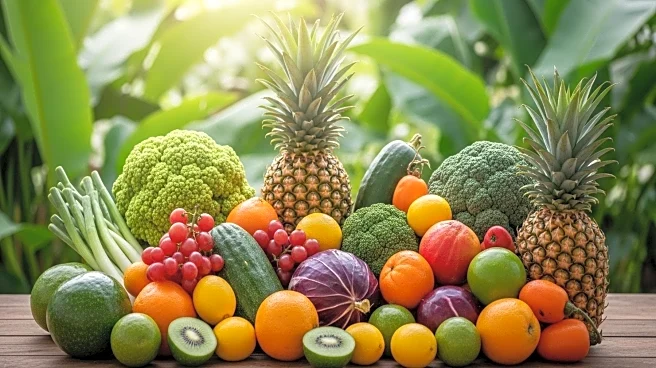What's Happening?
The government of Antigua and Barbuda has praised the Inter-American Institute for Cooperation on Agriculture (IICA) for its efforts in enhancing the country's agricultural sector. During the 2024 national accountability seminar, Permanent Secretary Walter Christopher highlighted IICA's strategic interventions and alignment with the ministry's priorities. The seminar, themed 'Cultivating Tomorrow's Agriculture Today,' showcased IICA's achievements and future plans, including the Next Generation Sweet Potato Production Project. IICA's focus on building resilience against climate risks and promoting sustainable agricultural practices was emphasized by Gregg Rawlins, IICA Representative for the Eastern Caribbean States.
Why It's Important?
IICA's work in Antigua and Barbuda is crucial for strengthening the country's agricultural systems, particularly in the face of escalating climate risks. By promoting sustainable technologies and practices, IICA aims to enhance food security and economic stability in the region. The organization's initiatives, such as the Next Generation Sweet Potato Production Project, provide farmers with essential resources and knowledge to improve productivity and resilience. The government's endorsement of IICA underscores the importance of international cooperation in addressing climate challenges and supporting sustainable development in vulnerable regions.
What's Next?
IICA plans to continue its efforts in Antigua and Barbuda, focusing on implementing its 2025 Work Plan and addressing the challenges identified during the seminar. The organization will work closely with local stakeholders, including government officials and farmers, to ensure the successful execution of its projects. Ongoing discussions and collaborations will be essential for adapting to climate impacts and achieving long-term agricultural sustainability. The outcomes of IICA's initiatives could serve as a model for other Caribbean nations facing similar challenges.
Beyond the Headlines
The seminar highlighted the broader implications of climate change on agriculture in the Caribbean. IICA's emphasis on resilience and sustainable practices reflects a growing recognition of the need for adaptive strategies in the face of environmental uncertainties. The organization's work also raises questions about the role of international institutions in supporting local communities and fostering innovation in agriculture. As climate risks continue to threaten food security, the success of IICA's initiatives could influence policy decisions and investment priorities in the region.









